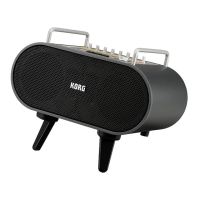Recorder mode
23
About the count time signature
The time signature of the count is shared with the metronome.
If you want to change it, hold down the [Metronome] buon
and turn the VALUE dial.
Mark function
This function lets you register a mark at a desired location within
a song, and then recall that location when needed, such as when
recording. You can register marks at eight locations in a song, and
move directly to a registered mark by pressing a buon.
Registering a mark
1. Use the [F1]/[F2] buons to select a song.
2. Press the [
] buon to play the song.
3. At the location at which you want to register a mark, hold
down the [Set/OK] buon and press one of the [M1]–
[M8] buons (the buon lights).
4. Press the [
] buon to stop the song.
5. Press the [M1]–[M8] buon that you registered.
You move to the location in the song at which you
registered the mark.
Deleting a mark
1. Hold down the [Clear/Cancel] buon and press the
buon ([M1]–[M8]) in which you registered the mark that
you want to delete.
The mark registered to the buon you pressed is deleted
(the buon goes dark).
Loop recording/playback function
You can loop-playback or record the region between marks
that you specify.
Playing a loop or recording a region
Here we explain how to loop-playback and record the region
between the marks registered to the [M1] buon and [M2] buon.
1. Press the [Loop/Auto] buon to turn the loop function on
(the buon lights up).
2. Press the [M1] buon to specify the loop-start location.
The buon blinks, and the loop region is specied as the
region between the locations registered to the [M1] and
[M2] buons.
Note: Allow at least two seconds for the loop region.
The loop region is the region between the loop-start
location and the location registered to the next buon to
the right. For example if you specify the [M1] buon as the
loop-start location, the loop region is the [M1]–[M2] region;
if you specify the [M2] buon as the loop-start location,
the loop region is [M2]–[M3]. If no mark is registered to
the next-numbered buon, the loop seing is ignored. You
can’t specify the [M8] buon as the loop-start location.
3. Press the [
] buon.
Loop playback occurs between the locations of the [M1]
buon and [M2] buon.
4. Press the [ ] buon.
After playback reaches the end of the loop region,
recording begins from the loop-start location.
5. Play your instrument to record it.
Recording ends when you reach the end of the loop region,
and loop playback resumes.
If you want to continue overdubbing, press the [ ] buon
again and repeat the process.
6. Press the [
] buon to stop recording.
Exporting song data
Song data that you record can be exported (wrien) as an
audio le to the SD card.
The exported audio le can be played back using the
STAGEMAN 80’s Player mode or a commercially available
audio player, or loaded into your computer DAW.
The exported audio le is in the following format.
• File format: WAVE format uncompressed linear PCM
• Bit depth: 16-bit
• Sampling frequency: 44.1 kHz
• File name: SONGnnnn.WAV (the four characters “nnnn”
are an automatically assigned consecutive number)
Export procedure
1. Use the [F1] or [F2] buons to select the song that you
want to export.
2. Press the [Write] buon.
3. Press the [Set/OK] buon to export the song.
If you decide to cancel, press the [Clear/Cancel] buon.
The exported data is saved in the M1 folder of the SD card.
When exporting is complete, the [Write] buon goes dark
and the four-digit number of the exported le is displayed.
The time required for exporting depends on the amount
of free space on the SD card and on the length of the song
you’re exporting.
Importing an audio le
An audio le in the SD card can be imported (loaded) into
song data that you can use in Recorder mode. The imported
data can be played or overdubbed in Recorder mode.
An audio le that can be played in Player mode cannot be
directly played back in Recorder mode. The le must be
imported as Song data that can be played in Recorder mode.
Audio les of the following format can be imported.
• File format: WAVE format uncompressed linear PCM
• Bit depth: 16-bit
• Sampling frequency: 44.1 kHz, stereo les
Import procedure
1. In Player mode, use the [F1] or [F2] buons to select the
audio le that you want to import.
2. Press the [Write] buon.
3. Use the [F1] or [F2] buon to select the import-
destination song number.
The display indicates the song number (d01, d02...). The
number of a new song blinks, and the number of an
already-recorded song is lit.
Tip: If there is a new song, the lowest-numbered new song
is selected automatically.
If you select an already-recorded song (whose song
number is lit) and begin the import, the selected song
data is erased and overwrien by the imported data.
4. Press the [Set/OK] buon to import the song.
If you decide to cancel, press the [Clear/Cancel] buon.
The imported song data is placed in the song number that
you specied.
The imported data is saved in the D*** folder of the SD card.

